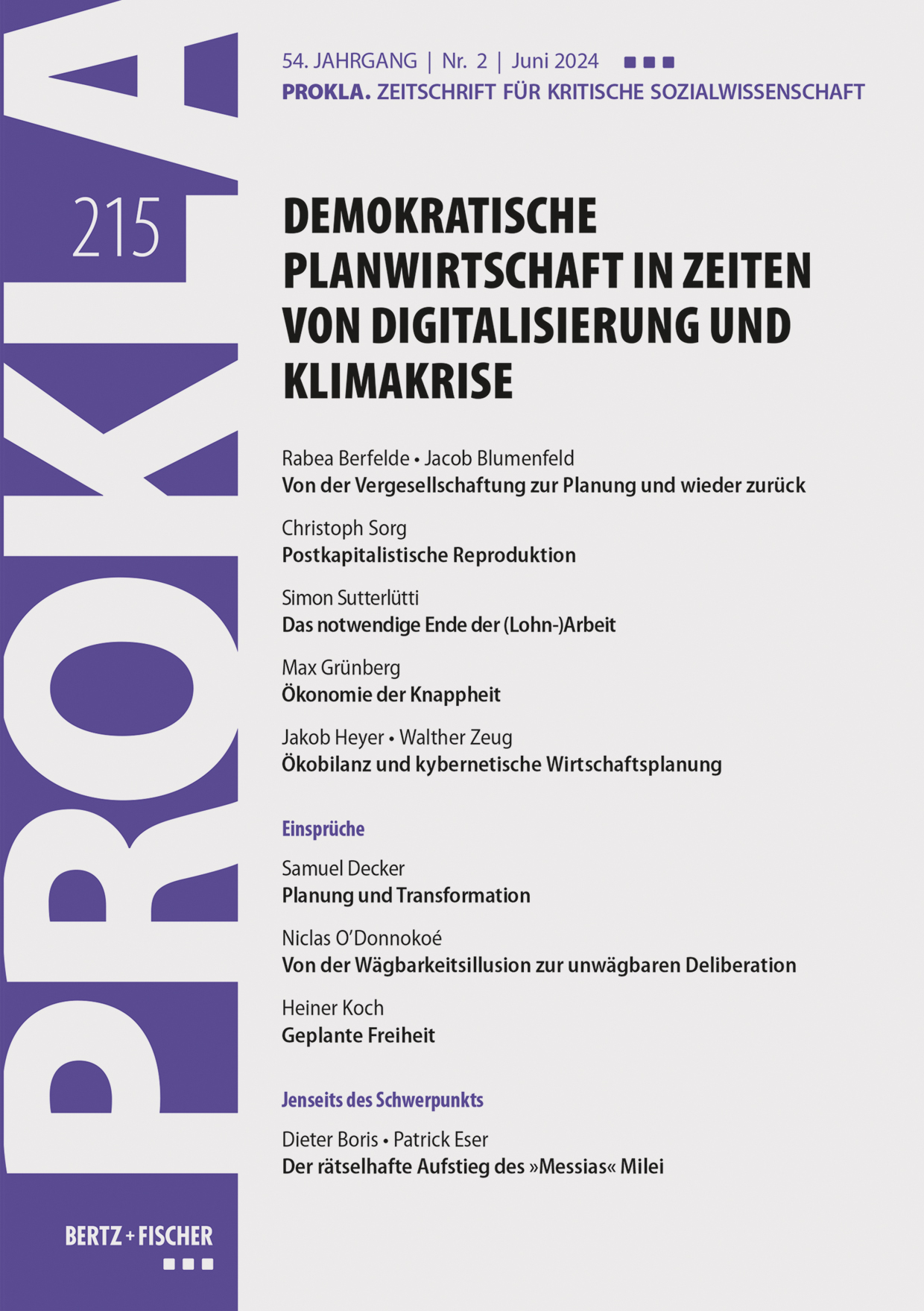Economics of Scarcity
A Mode of Production in Search for Allocative Efficiency
DOI:
https://doi.org/10.32387/prokla.v54i215.2115Keywords:
Allocation Problem, Coordination, Economic Planning, Relative ScarcityAbstract
Against the hope to overcome scarcity, I argue to center any speculation about the functioning of a postcapitalist economy on approaches of how society might administer scarcity. Beginning the analysis from Lionel Robbins’ concept of relative scarcity, four fundamental allocative mechanisms are presented as an alternative to the market mechanism. Yet, in light of their evident inadequacy to efficiently coordinate the material flows of the world economy, I conclude that others might also have to get to terms with a socialist interpretation of markets, which restricts planning ambitions to the commanding heights of the economy.
Downloads
References
Albert, Michael / Robin, Hahnel (1991): The Political Economy of Participatory Economics. New Jersey. DOI: https://doi.org/10.1515/9780691216003. DOI: https://doi.org/10.1515/9780691216003
Balla, Bálint (1978): Soziologie der Knappheit: Zum Verständnis individueller und gesellschaftlicher Mängelzustände. Stuttgart.
Bastani Aaron (2019): Fully Automated Luxury Communism: A Manifesto. London.
Cockshott, Paul / Cottrell, Allin (1993): Towards a New Socialism. Nottingham.
Cole, George (1935): Principles of Economic Planning. London.
Christopher, Brett (2023): The Price is Wrong: Why Capitalism Won’t Save the Planet. London.
Deutsche Wohnen & Co. enteignen (2023): Gemeingut Wohnen. Eine Anstalt öffentlichen Rechts fu?r Berlins vergesellschaftete Wohnungsbestände. URL: https://content.dwenteignen.de/uploads/Gemeingut_Wohnen_3a03fa4c87.pdf, Zugriff 11.2.2024.
Dobb, Maurice (1967): Some Further Comments on the Discussion about Socialist Price-policy. In: Papers on Capitalism, Development, and Planning. London.
Grünberg, Max (2023a): The Planning Daemon: Future Desire and Communal Production. In: Historical Materialism 31(4): 115-149. DOI: https://doi.org/10.1163/1569206x-bja10001. DOI: https://doi.org/10.1163/1569206x-bja10001
– (2023b): Automating away the centre? Optimal planning and the menace of bureaucratisation. Early Access. In: Competition & Change 0(0). DOI: https://doi.org/10.1177/10245294231218868. DOI: https://doi.org/10.1177/10245294231218868
Harvey, David (1974): Population, Resources, and the Ideology of Science. In: Economic Geography 50(3): 256-277. DOI: https://doi.org/10.2307/142863
Hayek, Friedrich A. (1948): The Use of Knowledge in Society. In: Individualism and Economic Order. Chicago.
– (2007): The Road to Serfdom. Chicago.
Heller, Ágnes (1980): Theorie der Bedürfnisse bei Marx. Hamburg.
Jevons, William S. (1865): The Coal Question. London/Cambridge.
Kornai, János (1980): Economics of Shortage. Amsterdam.
Laibman, David (2022): Systemic Socialism: A Model of the Models. In: Science & Society 86(2): 225-247. DOI: https://doi.org/10.1521/siso.2022.86.2.225. DOI: https://doi.org/10.1521/siso.2022.86.2.225
Malthus, Thomas (1798): An Essay on the Principle of Population. London.
Meretz, Stefan / Sutterlütti, Simon (2018): Kapitalismus aufheben: Eine Einladung, über Utopie und Transformation neu nachzudenken. Hamburg.
– (2023): Verteilte commonistische Planung. URL: https://keimform.de/2023/anarchistische-gesellschaftsentwuerfe, Zugriff: 11.2.2024.
MEW – Marx, Karl / Engels, Friedrich: Marx-Engels-Werke. Berlin 1956ff.
Mises, Ludwig von (1932): Die Gemeinwirtschaft. Untersuchungen über den Sozialismus. Jena. DOI: https://doi.org/10.1515/9783110504705. DOI: https://doi.org/10.1515/9783110504705
Mouffe, Chantal (2000): The Democratic Paradox. London.
Paech, Nico (2012): Liberation from Excess: The Road to a Post-Growth Economy. München. DOI: https://doi.org/10.14512/9783865815279. DOI: https://doi.org/10.14512/9783865815279
Ritchie, Hannah (2023): China uses as much cement in two years as the US did over the entire 20th century. URL: https://www.sustainabilitybynumbers.com/p/china-us-cement, Zugriff 17.4.2024.
Robbins, Lionel (1937): Economic Planning and International Order. London.
– (1945): An Essay on the Nature and Significance of Economic Science. London.
Roemer, John (1994): A Future for Socialism. Cambridge. DOI: https://doi.org/10.1177/0032329294022004003
Sahlins, Marshall (2017): Stone Age Economics. London. DOI: https://doi.org/10.4324/9781315184951. DOI: https://doi.org/10.4324/9781315184951
Saito, Kohei (2017): Karl Marx’s Ecosocialism: Capital, Nature, and the Unfinished Critique of Political Economy. New York. DOI: https://doi.org/10.2307/j.ctt1gk099m. DOI: https://doi.org/10.2307/j.ctt1gk099m
Vogl, Joseph (2020): Oikodizee. In: Vogl, Joseph / Wolf, Burckhardt (Hg.) Handbuch Literatur & Ökonomie. Berlin/Boston: 224-226. DOI: https://doi.org/10.1515/9783110516821-043. DOI: https://doi.org/10.1515/9783110516821-043
Welz, Gisela (2015): Knappheit – eine anthropologische Kategorie? In: Tauschek, Markus / Grewe, Maria (Hg.): Knappheit, Mangel, Überfluss. Kulturwissenschaftliche Positionen zum Umgang mit begrenzten Ressourcen. Frankfurt/New York: 35-56.






